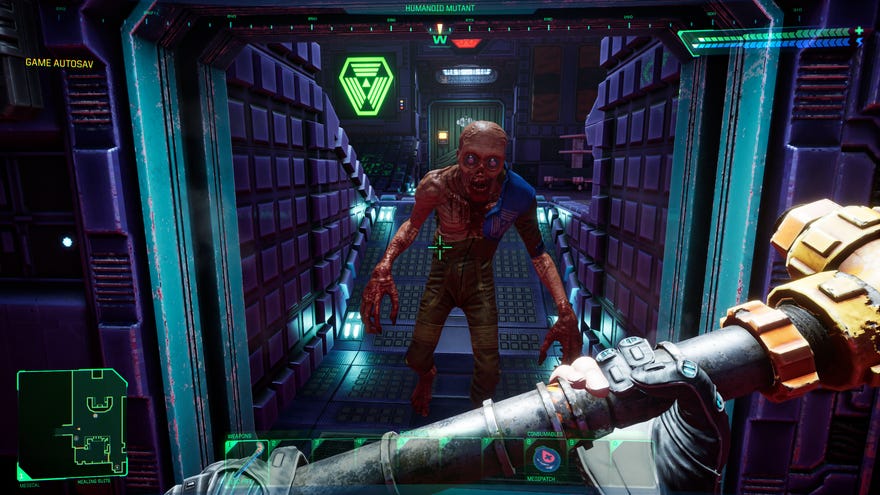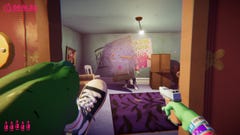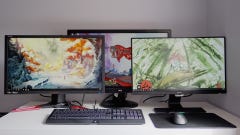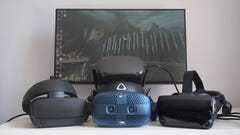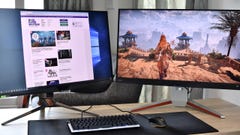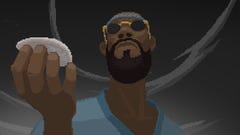How System Shock 2 made Stephen Kick and Nightdive Studios
“Hey, I’ve got this far. Let’s see how far I can take it.”
“Oh yeah, we’ve got the System Shock IP,” said the insurance company. “What do you want to do with it? Do you want to make a sequel?”
It’s a question you could imagine being posed to Ken Levine, or Warren Spector, or several other notable designers who could reasonably lay claim to the legacy of Looking Glass and Irrational’s legendary immersive sims. Instead, it was asked of Stephen Kick - at the time, a recently unemployed videogame artist holidaying in a Guatemalan hostel. Up until that point, Kick had dedicated his life to creative pursuits. He had no business background, and none of the acumen required to understand contracts or negotiate licensing fees. More to the point, he had no more than $5,000 to his name. Hardly the foundation for a follow-up to two of the most acclaimed PC games of all time.
“I’m in the middle of the jungle on satellite internet,” he recalls now. “It’s not really in my near future, you know?” And yet, finding himself at an existential crossroads, Kick pitched the insurance company on re-releasing System Shock 2. And they said yes.
“From then on, I felt like I had just jumped into the ocean,” he says. “The intent of the trip was to expose myself to things that were brand new, so that my brain could connect some new synapses and make some new experiences and maybe find inspiration in things that previously I may not have known about. And it really ignited this passion for, ‘Hey, I’ve got this far. Let’s see how far I can take it.’” So far, Kick has taken it all the way to a lavish, ground-up remake of System Shock, built by his own game studio, the remaster specialists Nightdive.
But his journey with System Shock, the series that kickstarted Nightdive and ultimately led to its purchase by Atari for an initial consideration of $10 million, didn’t start in the jungle. It began in early 1999, as the snow and dark gathered in Massachusetts. A buddy at school had recommended System Shock 2 as a chaser to Half-Life, and Kick carried the borrowed game home in its hulking box.
“It was one of those perfect evenings,” Kick recalls. “There was that cold feeling even though it was comfortable next to my computer. And I just remember playing it and just getting totally immersed in it and not stopping for hours and hours and hours.” Back then, Kick had developed a habit of playing games to the accompaniment of CDs on his boombox. He cued up the industrial rock band Filter. “There’s this one song that came on while the Shodan reveal was happening,” he says. “This really ethereal female voice talked about how humanity is a cancer on Earth, and it just gelled so perfectly. I’ll never forget that.”
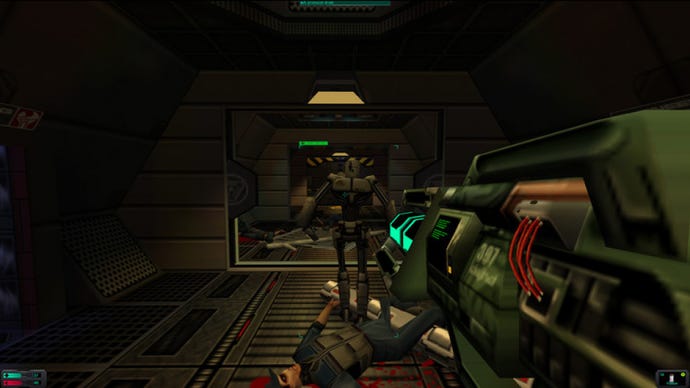
Then Kick grew up, joined Sony Online Entertainment in San Diego as a character artist, and burned out - which is when he and his girlfriend took that fateful trip to Central America. “We quit our jobs, put everything in the car, drove across the border into Tijuana, and basically just travelled for ten months.” Beforehand, Kick had loaded up a laptop with “whimsical things that would provide me with a lot of enjoyment”. The Curse Of Monkey Island. Full Throttle. Fallout. During a torrential tropical downpour in Guatamala - perhaps compelled by the memory of another, much colder, extreme weather event - he booted up System Shock 2.
“And I just kept getting error messages,” he says. “All the little tricks that I could try to get it to work didn’t work. So I went to GOG.com, because why wouldn’t they have this? It’s one of the best games of all time. And that’s when I discovered that it was their number one wishlisted game.” That second dead end prompted another question: “What happened to the rights? Why can’t they release this?” Kick headed to the Wayback Machine, and looked up old articles from the time that Looking Glass went out of business.
“They had all the pieces, they needed to do something with System Shock, they just didn’t know what”
“I found an article by Jared Newman, for G4TV, about how when Looking Glass went under the rights to the game were split, and the IP went to their insurance company,” he says. “The trademark remained with Electronic Arts.” And so Kick found the insurer, and fired over an email using the contact form on their website. It was only a day later that the company’s general counsel got in touch to offer System Shock 3.
By extraordinary coincidence, around the same time, EA had let its trademark lapse - and the insurance company had snatched it up. But legally speaking, the only way to secure that trademark was to use it. “They had all the pieces, they needed to do something with System Shock, they just didn’t know what,” Kick says. “Because they’re an insurance company.”
It’s an unlikely story, and the wider games industry initially treated it as such. When Kick approached GOG.com, they were incredulous that a nobody with a newly-registered company had secured the rights to its most-wanted game. “They didn’t believe me,” Kick says. “They actually said in the email that I was full of shit. Because they had been trying to get this game for years. Like, how does this kid just get it? They asked me a bunch of questions, like, ‘Which of your family members works at this insurance company?’” Later, after System Shock 2’s relaunch, Ken Levine’s agent found Kick’s phone number and rang him up out of the blue, demanding to know who he was. “It felt like an interrogation,” he says. “And immediately I was like, ‘Oh my god, what did I just get into?’”
After that initial breakthrough, Kick returned to GOG.com’s wishlist of old games yet to be adapted for digital release, and worked his way through. Even where some games were already available as GOG exclusives, he reached out to rights holders and offered to make them money on Steam as well. “That’s where we got The 7th Guest and The 11th Hour,” he says. “We were the ones to broker the deal with Harlan Ellison for I Have No Mouth, And I Must Scream. It was a lot easier to get those types of deals where the game was still owned by an individual.”
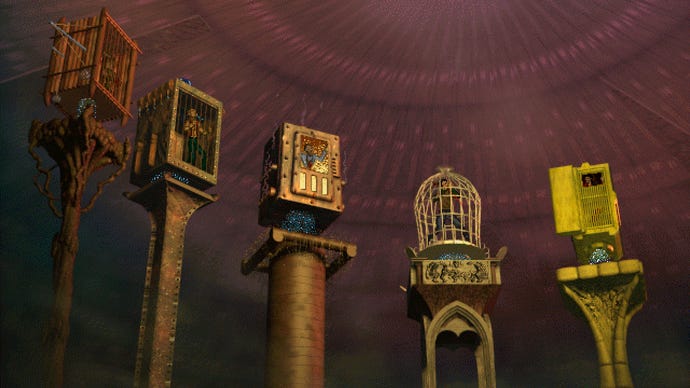
Over time, Nightdive progressed from curios and cult classics - like the campy comic book adventure Noctropolis, and Bad Mojo, which cast you as a cockroach - to collaborations with major publishers, like Turok and Doom 64. Ten years on from that first deal, despite the occasional misstep and iffy launch, Kick and the company are respected players in the games industry. Yet fittingly, they’re still deeply involved with System Shock - having bought the rights from the insurers, and committed to the new remake of the 1994 original.
“We didn’t go so far that the formula would be unrecognisable,” Kick says. “The labyrinthian level design, for one thing, is something that we wanted to maintain. But the inventory management and the interactivity from System Shock 2 and Bioshock, we brought back. There’s so much borrowing from all these different games that were originally inspired by the first one that helped us amalgamate this new remake.”
Nightdive haven't messed with the narrative structure of the original campaign, but have rewritten some of the lines to create more bonds between characters around Citadel station. They also preserved System Shock’s considered approach to shooting - furnishing you with alternative ammo types, and pushing you to match your weapons to your targets, whether they be mechanical or biological. “We made sure that there were lots of opportunities to experiment and figure out what worked best because of the limited inventory that you’d have,” Kick says. “Knowing you could only carry so much ammo and so many different weapon types, stuff that really makes you think about your choices.”
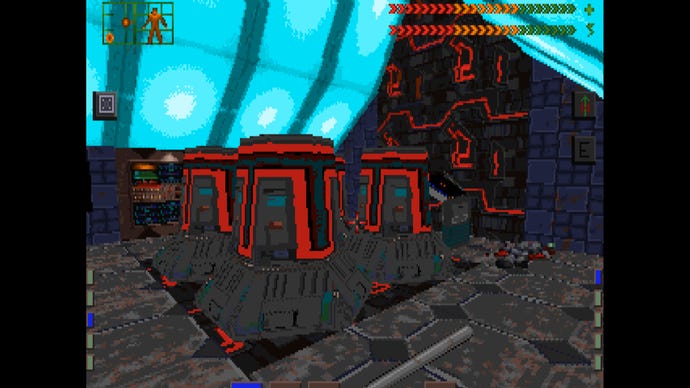
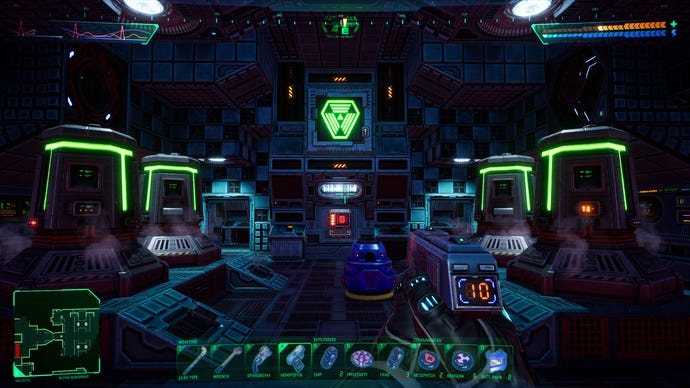
Nightdive have kept, too, the surprisingly forward-thinking difficulty options for System Shock - which allowed you to configure not only combat but puzzles, and even alter the complexity of the story to suit your tastes. It’s a degree of granularity that the wider games industry has only recently begun to adopt. “To be able to change a couple of factors like that before the game starts is gonna just make it more accessible for a lot of people,” Kick says. That said, Nightdive eschewed many of the player safety nets of modern AAA productions. “If you wanted the real System Shock experience, you had to listen to the audio logs,” he says. “You were probably going to need a piece of paper to write down door codes.
“We’ve already had a lot of people go, ‘Where do I go, what do I do?’” he adds. “And it’s like, ‘Well, were you even listening? The characters tell you what to do, in a roundabout way.’ I think it’s going to take a lot of people by surprise, but I hope that Dark Souls and Cuphead fans are gonna like this.”
It’s been an expensive and difficult project, and its success or otherwise will determine whether Nightdive tackle another remake on the same scale. Once again, System Shock is the axis upon which Kick’s future turns. But whatever the outcome, the company’s guiding philosophy will continue. “I want people to make games that are influenced by our past,” Kick says. “As far back as we can go. And the only way we can do that is if we preserve them for people to play.”
